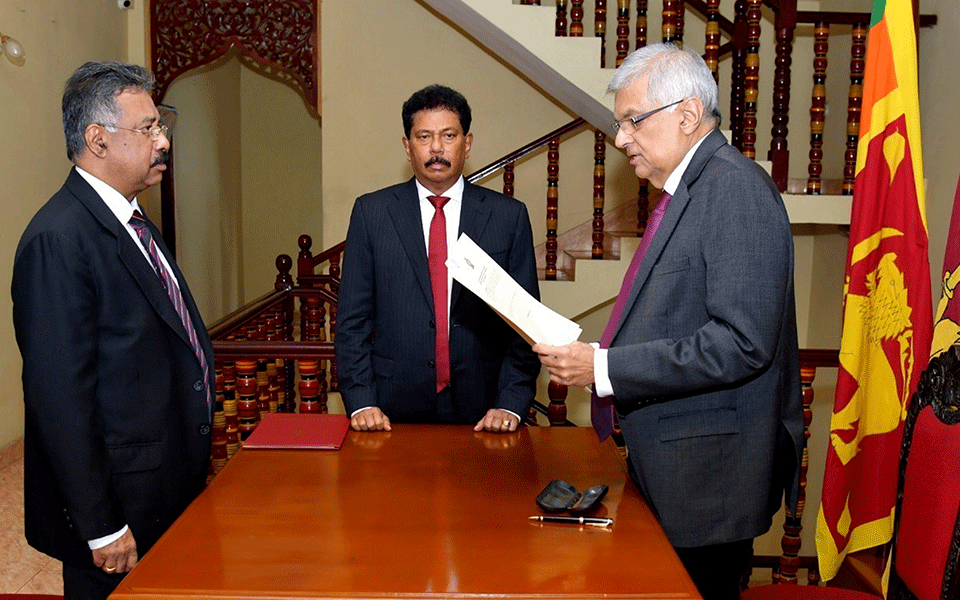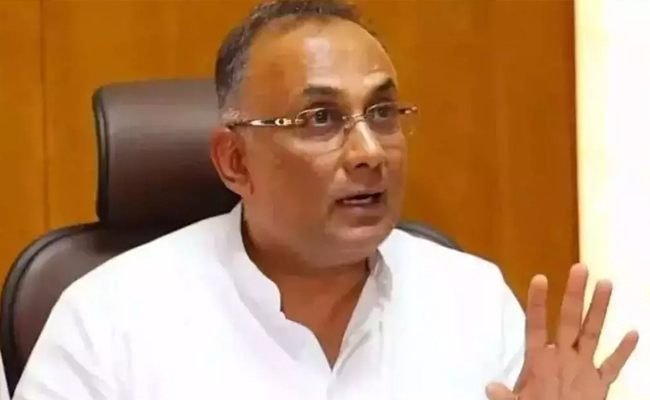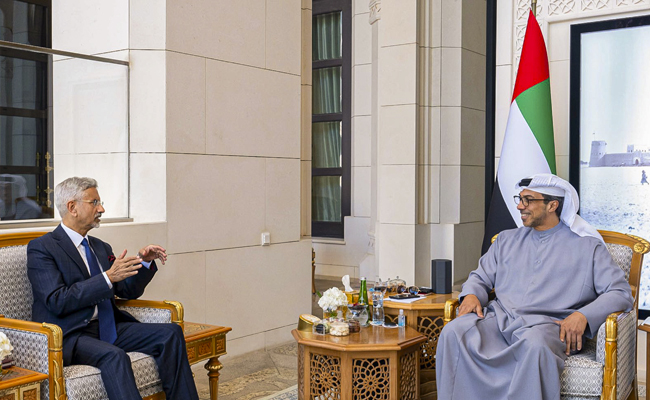Colombo(PTI): Veteran politician Ranil Wickremesinghe was on Thursday sworn in as Sri Lanka's eighth president and will face the tough task of leading the country out of its economic crisis and restoring order after months of mass protests.
Wickremesinghe, 73, was sworn in as the 8th Executive President of Sri Lanka at the Parliament complex before Chief Justice Jayantha Jayasuriya.
Wickremesinghe, who took over as the Acting President after his predecessor Gotabaya Rajapksa fled the country and resigned last week, is the first Sri Lankan president to be elected by Parliament following a vote.
Late D B Wijetunga was elected uncontested in May 1993 after the demise of R Premadasa who was the then President.
Wickremesinghe, a six-time former prime minister, was elected as Sri Lanka's President by lawmakers on Wednesday, in a rare move that could provide continuity for crucial discussions with the IMF for a bailout deal for the cash-strapped nation.
He secured 134 votes in the 225-member House while his nearest rival and dissident ruling party leader Dullas Alahapperuma got 82. Leftist Janatha Vimukthi Peramuna leader Anura Kumara Dissanayake secured just three votes during the voting held in Parliament amidst tight security.
He faces the task of leading the country out of its economic collapse and restoring order after months of mass protests.
A Cabinet of 20-25 members will be appointed within the next few days to serve under President Wickremesinghe, the Daily Mirror newspaper reported.
Wickremesinghe's comfortable victory with the backing of the Rajapaksa's Sri Lanka Podujana Peramuna (SLPP) party showed the Rajapaksa family's firm grip on Sri Lankan politics despite the resignations of President Rajapaksa, former prime minister Mahinda Rajapaksa and former finance minister Basil Rajapaksa in recent weeks in the face of massive anti-government protests.
Wickremesinghe's victory could inflame the situation once again as many anti-government protesters see him as inextricably tied to the erstwhile Rajapaksa regime, blamed for the country's worst economic crisis since independence in 1948.
A few hundred protesters quickly gathered after Wickremesinghe was elected as president to express their outrage as they see him as part of the problematic political establishment.
Wickremesinghe, who has been leading the crucial talks with the International Monetary Fund (IMF), last week said that negotiations were nearing conclusion.
Sri Lanka needs about USD 5 billion in the next six months to cover basic necessities for its 22 million people, who have been struggling with long queues, worsening shortages and power cuts.
Sri Lankans had been for months calling for Rajapaksa, whose family had dominated politics in the country for much of the past two decades, to resign.
After demonstrators stormed the presidential palace and several other government buildings, President Rajapaksa fled and then resigned.
Wickremesinghe will have a mandate to serve out the rest of Rajapaksa's term, which ends in November 2024.
Wickremesinghe, who has been in Parliament for nearly five decades, was appointed as prime minister in May, nearly two years after his United National Party (UNP) was routed and failed to win a single seat in the general election held in 2020.
Widely accepted in political circles as a man who could manage the economy with far-sighted policies, Wickremesinghe is struggling to fix the economy which, he said, had collapsed at the time of his appointment in May.
Wickremesinghe, who is believed to be close to India and its leaders, has held many important posts during his career.
His immediate challenge, along with trying to ensure a steady supply of food and fuel, is to convince the protesters to give him a chance.
Let the Truth be known. If you read VB and like VB, please be a VB Supporter and Help us deliver the Truth to one and all.
New Delhi: A bill to set up a 13-member body to regulate institutions of higher education was introduced in the Lok Sabha on Monday.
Union Education Minister Dharmendra Pradhan introduced the Viksit Bharat Shiksha Adhishthan Bill, which seeks to establish an overarching higher education commission along with three councils for regulation, accreditation, and ensuring academic standards for universities and higher education institutions in India.
Meanwhile, the move drew strong opposition, with members warning that it could weaken institutional autonomy and result in excessive centralisation of higher education in India.
The Viksit Bharat Shiksha Adhishthan Bill, 2025, earlier known as the Higher Education Council of India (HECI) Bill, has been introduced in line with the National Education Policy (NEP) 2020.
The proposed legislation seeks to merge three existing regulatory bodies, the University Grants Commission (UGC), the All India Council for Technical Education (AICTE), and the National Council for Teacher Education (NCTE), into a single unified body called the Viksit Bharat Shiksha Adhishthan.
At present, the UGC regulates non-technical higher education institutions, the AICTE oversees technical education, and the NCTE governs teacher education in India.
Under the proposed framework, the new commission will function through three separate councils responsible for regulation, accreditation, and the maintenance of academic standards across universities and higher education institutions in the country.
According to the Bill, the present challenges faced by higher educational institutions due to the multiplicity of regulators having non-harmonised regulatory approval protocols will be done away with.
The higher education commission, which will be headed by a chairperson appointed by the President of India, will cover all central universities and colleges under it, institutes of national importance functioning under the administrative purview of the Ministry of Education, including IITs, NITs, IISc, IISERs, IIMs, and IIITs.
At present, IITs and IIMs are not regulated by the University Grants Commission (UGC).
Government to refer bill to JPC; Oppn slams it
The government has expressed its willingness to refer it to a joint committee after several members of the Lok Sabha expressed strong opposition to the Bill, stating that they were not given time to study its provisions.
Responding to the opposition, Parliamentary Affairs Minister Kiren Rijiju said the government intends to refer the Bill to a Joint Parliamentary Committee (JPC) for detailed examination.
Congress Lok Sabha MP Manish Tewari warned that the Bill could result in “excessive centralisation” of higher education. He argued that the proposed law violates the constitutional division of legislative powers between the Union and the states.
According to him, the Bill goes beyond setting academic standards and intrudes into areas such as administration, affiliation, and the establishment and closure of university campuses. These matters, he said, fall under Entry 25 of the Concurrent List and Entry 32 of the State List, which cover the incorporation and regulation of state universities.
Tewari further stated that the Bill suffers from “excessive delegation of legislative power” to the proposed commission. He pointed out that crucial aspects such as accreditation frameworks, degree-granting powers, penalties, institutional autonomy, and even the supersession of institutions are left to be decided through rules, regulations, and executive directions. He argued that this amounts to a violation of established constitutional principles governing delegated legislation.
Under the Bill, the regulatory council will have the power to impose heavy penalties on higher education institutions for violating provisions of the Act or related rules. Penalties range from ₹10 lakh to ₹75 lakh for repeated violations, while establishing an institution without approval from the commission or the state government could attract a fine of up to ₹2 crore.
Concerns were also raised by members from southern states over the Hindi nomenclature of the Bill. N.K. Premachandran, an MP from the Revolutionary Socialist Party representing Kollam in Kerala, said even the name of the Bill was difficult to pronounce.
He pointed out that under Article 348 of the Constitution, the text of any Bill introduced in Parliament must be in English unless Parliament decides otherwise.
DMK MP T.M. Selvaganapathy also criticised the government for naming laws and schemes only in Hindi. He said the Constitution clearly mandates that the nomenclature of a Bill should be in English so that citizens across the country can understand its intent.
Congress MP S. Jothimani from Tamil Nadu’s Karur constituency described the Bill as another attempt to impose Hindi and termed it “an attack on federalism.”



_vb_22.jpeg)

